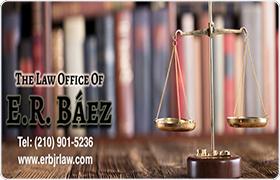La Coste DUI-DWI Lawyer, Texas, page 3
Sponsored Law Firm
-
 x
x

Click For More Info:
-
The Law Office of E.R. Báez
700 N. Saint Mary's Street Suite 1400 San Antonio, TX 78205» view mapCriminal Defense Law The Pastor Lawyer
Every client is special to us and every client will be treated with respect and dignity. No matter how difficult the case may be, Mr. Báez will treat you with the upmost dignity.
800-903-7181
John Ritenour
DUI-DWI, Federal Appellate Practice, Domestic Violence & Neglect, , Firearms
Status: In Good Standing Licensed: 29 Years
Patrick T Peranteau
Family Law, DUI-DWI, Constitutional Law, Antitrust
Status: In Good Standing Licensed: 37 Years
FREE CONSULTATION
CONTACT E.R. Báez San Antonio, TX
E.R. Báez San Antonio, TX Practice AreasExpertise
Practice AreasExpertise
